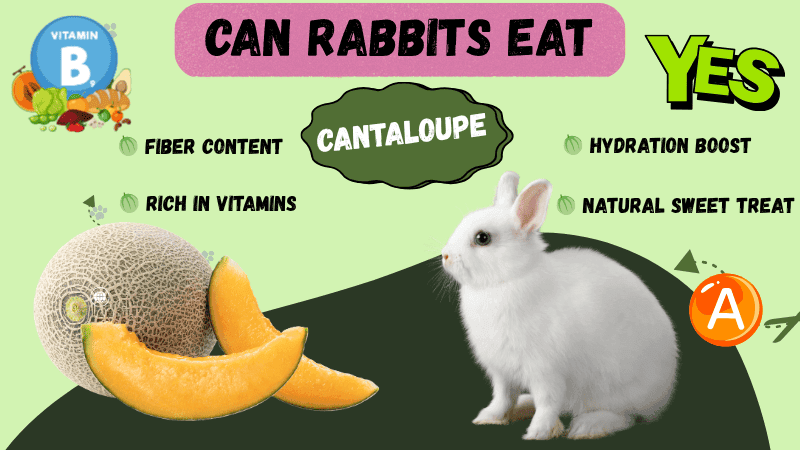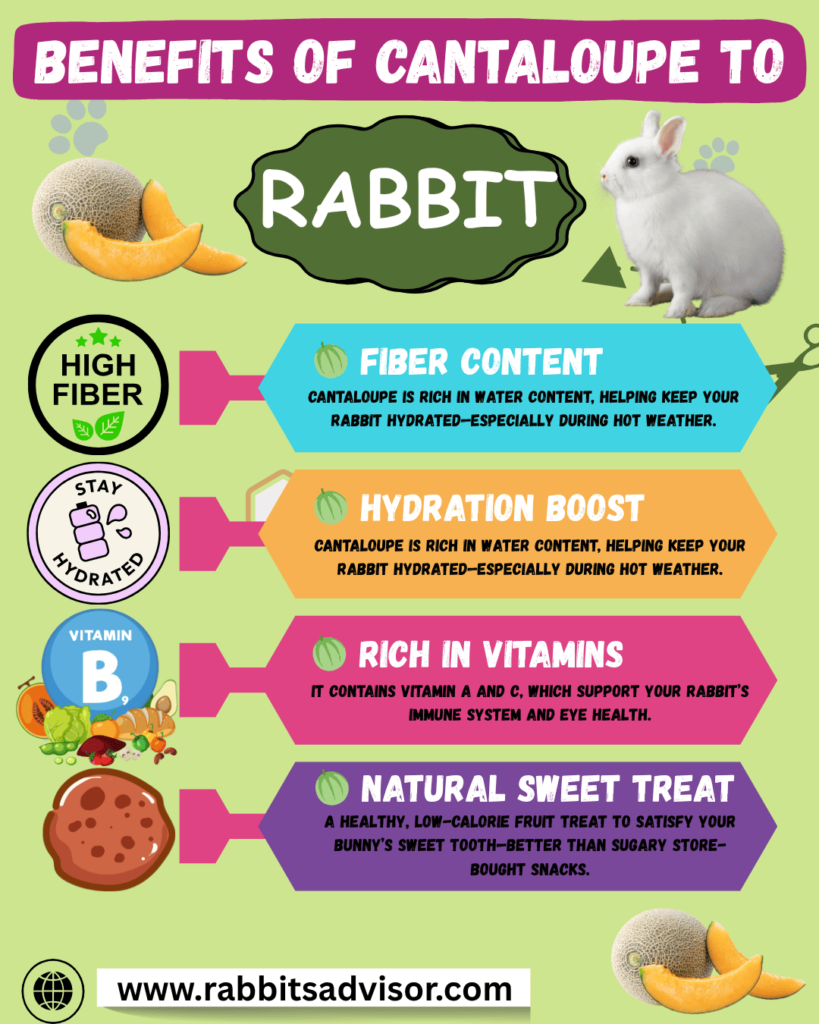Can Rabbits Eat Cantaloupe or Not? Many rabbit owners frequently ask this question. Although cantaloupe can offer a range of vitamins and minerals, it’s crucial to know the possible risks and to feed your rabbit in moderation.
Cantaloupe sometimes referred to as muskmelon or rockmelon. This is yummy fruit comes in the list of Cucurbitaceae family that contains watermelons, cucumbers, and pumpkins. It is a round or oval fruit with soft, aromatic orange or greenish flesh and tan, netted, or ribbed skin.

The possible health benefits and risks of giving your rabbit cantaloupe will be covered in this article. Along with, best methods for preparing cantaloupe and safe feeding practices will also be covered.
Is Cantaloupe Safe For Rabbits?
When you come to selecting a natural treat for your bunny, then cantaloupe is a great option. This is because rabbits need a lot of vitamins and minerals.
Also Read: Can Rabbits Eat Ginger Root and Juice? Risks and Benefits
But keep wait!
There’s something you should know before giving your bunny a large piece of cantaloupe. Consuming foods heavy in sugar and water can result in unpleasant gas and diarrhea.
Make sure you just serve the recommended amount of food. Rabbits benefit from cantaloupe, but too much of it might be dangerous.
Health Benefits of Giving Cantaloupe to Rabbit
The most important health tip for pets like rabbits and bunnies is to stay hydrated. 90% of cantaloupe is water. It will keep your pet hydrated and healthy. Vitamin C supports a healthy blood system and aids in the growth of rabbit muscles.
As an antioxidant, vitamin C benefits the skin, connective tissues, and bones. Rabbits require vitamin C; if they don’t get enough of it, they may develop scurvy. This disease is prevalent in rabbits.
Lycopene is an antioxidant that comes with anti-cancer effects. Lycopene can help keep your bunnies from developing cancer. Vitamin A helps your pet’s bones grow and their eyesight. Beta-carotene, which cantaloupe provides in good amounts, helps reduce age-related blindness.
Magnesium and potassium are abundant in cantaloupe. Studies have shown that this nutrient can lower the chance of dying from heart disease.
Potassium can prevent the loss of muscle mass and lower the incidence of kidney stones. Fiber from cantaloupe improves intestinal motility and relieves constipation. For rabbits, fiber is a vital part of their well-being.
Nutrition Profiles of Cantaloupe
Here, you will get to know all nutritional profile of cantaloupe for your beloved rabbits, including:
Also Read: Can Rabbits Eat Garlic? Chives, Leaves, Powder, & Mustard
| Nutrient | Amount Per 100g |
|---|---|
| Calories | 34 kcal |
| Water | 89.82 g |
| Protein | 0.84 g |
| Total Fat | 0.19 g |
| Carbohydrates | 8.16 g |
| Fiber | 0.9 g |
| Sugars | 7.86 g |
| Vitamin C | 36.7 mg (61% DV) |
| Vitamin A (Beta-carotene) | 3382 µg |
| Vitamin K | 2.5 µg |
| Folate (Vitamin B9) | 21 µg |
| Potassium | 267 mg |
| Calcium | 9 mg |
| Magnesium | 12 mg |
| Phosphorus | 15 mg |
| Iron | 0.21 mg |
| Sodium | 16 mg |
Health Concerns of Cantaloupe to Rabbits
As overfeeding rabbits with cantaloupe carries some risk. Because of its high sugar content, cantaloupe can cause life-threatening health issues. A rabbit’s digestive system may finally shut down due to an overabundance of germs in the gut brought on by high blood sugar levels.
It can cause weight gain due to its high sugar content; rabbit can get obesity risk. Rabbits gain weight primarily as a result of consuming mush food and not exercising.
Diarrhea can result from overfeeding watermelon. Rabbits’ digestive tracts are delicate. The digestive system of baby rabbits is considerably more delicate.
It is possible for cantaloupe seeds to become lodged in the rabbit food line. Before serving the cantaloupe, take careful to remove all of the seeds.
How to Select the Best Cantaloupe for Your Rabbit?
You should be following some steps for selecting the ideal cantaloupe to your pet rabbit. When given sparingly, cantaloupe is a nutritious treat for rabbits. These pointers can help you choose the best cantaloupe for your pet.
Also Read: Can Rabbits Eat Oats and Oatmeal? A Complete Guide

Choose a cantaloupe that is ripe. Press the rind lightly to ensure the cantaloupe is ripe before choosing it. It ought to be a little mushy. It can have gone rotten if it is overly soft.
Take a whiff of the cantaloupe. The aroma of a ripe cantaloupe should be sweet. It might not be suitable for your rabbit to eat if it smells bad.
Pick a firm-rinded cantaloupe. Instead of being thin and delicate, the rind should be robust and hard. Cutting and getting ready for your rabbit will be simpler as a result.
Steer clear of overripe cantaloupe. A rabbit’s delicate stomach may become irritated by the sour flavor of overripe cantaloupes.
Before giving your rabbit cantaloupe, wash it. You get rid of any dirt or bacteria; make sure you give the cantaloupe a good wash.
You may choose the best cantaloupe for your pet rabbit by using the advice in this article. Always remember to give it plenty of clean, fresh water and to feed it sparingly.
Can Rabbits Eat Cantaloupe Seeds?
Sorry! Don’t feed any kind of seed. They can choke rabbits. You will face consequences if you vomit, as rabbits are incapable of doing so.
Also Read: Can Rabbits Eat Pumpkin (Seeds, Raw, Leaves, Skin, & Puree)? Full Guide
Cut it into little pieces, remove all the seeds, and feed it from a bowl. You can keep his fur clean by feeding it with your hand.
The fur stains are really difficult to get rid of. When it comes to baths and water, rabbits are very hesitant.
Can Rabbits Eat Cantaloupe Leaves?
Leaves and blooms of cantaloupe plants are indeed consumed by rabbits. It is very common for wild rabbits to munch on cantaloupe plants. You can get confirmation of that from any gardener.
Observe the recommended intake of leafy greens, which is no more than one cup for two pounds of body weight. Never give wilted leaves or flowers any food.
Signs of Adverse Reaction to Eating Cantaloupe
After eating cantaloupe, your rabbit may have an unpleasant reaction if it exhibits any of the following symptoms:
- Either loose stools or diarrhea
- Gas or bloating
- Weakness or lethargy
- Appetite loss
- Indications of pain or discomfort
Stop giving your rabbit cantaloupe. When you observe these symptoms, and get advice from a veterinarian.
How Do You Feed Cantaloupe to Your Rabbit?
Start with a tiny piece of cantaloupe to gradually add to your rabbit’s diet. And keep an eye out for any digestive problems.
Because only the flesh is safe for your rabbit, make sure to remove the seeds and rind.
Due to its high sugar content, cantaloupe should only be serving seldom; a teaspoon-sized piece is plenty.
Best Alternative of Cantaloupe to Rabbit
Here are 10 best alternatives to cantaloupe that you can safely serve your rabbit, like as:
Also Read: Can Rabbits Eat Sunflower Seeds, Leaves, Plants, & Stalks? Guide
- Strawberries
- Papaya
- Pineapple
- Apple (no seeds)
- Carrot (as a treat)
- Cucumber
- Romaine lettuce
- Basil
- Broccoli leaves and stems
- Bell pepper (sweet varieties)
FAQs (Frequently Asked Questions)
Can Rabbits Eat Cantaloupe Rind and Skin?
Rabbits may consume little amounts of cantaloupe peel and rind. The rind is less sweet and harder than the fruit, and eating too much of it can upset your stomach.
To get rid of chemicals or pesticides, always give the rind a thorough wash. Serve it as a treat once in a while rather than as a consistent component of their diet.
Can Baby Rabbits Have Cantaloupe?
Cantaloupes and other fruits of any kind are not advised for rabbits younger than 12 weeks. Only a very little amount of fruit should be feeding to young; but mature rabbits at first.
How Much Cantaloupe Is Safe to Serve for Rabbit?
Because cantaloupes are heavy in sugar, your rabbit might enjoy them. Regretfully, bunnies do not profit from high dietary sugar levels.
It’s better to give your rabbit small amounts of cantaloupe because of this. Small pieces of this delicious treat can be given to them many times a week.
Final Words: Can Rabbits Eat Cantaloupe?
At the final, rabbits are able to consume cantaloupe safely. This kind of fruit may give rabbits vital vitamins, minerals, and antioxidants, and it’s a terrific supplement to their diet.
Also Read: Can Rabbits Eat Raisins (Dried + Seeds)? Facts and Myths
It should be consumed in moderation; but not as a significant portion of their diet. In order to prevent any possible health hazards, the seeds and rind should also be eliminated prior to eating.
Do you have any experience, tips, tricks, or query regarding on this? You can drop a comment!
Have a Nice Day!!



